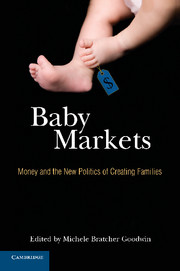Book contents
- Frontmatter
- Contents
- Preface
- Acknowledgments
- Introduction
- PART ONE WHAT MAKES A MARKET? EFFICIENCY, ACCOUNTABILITY, AND RELIABILITY OR GETTING THE BABIES WE WANT
- PART TWO SPACE AND PLACE: REPRODUCING AND REFRAMING SOCIAL NORMS OF RACE, CLASS, GENDER, AND OTHERNESS
- PART THREE SPECTRUMS AND DISCOURSES: RIGHTS, REGULATIONS, AND CHOICE
- 10 Reproducing Dreams
- 11 Why Do Parents Have Rights?: The Problem of Kinship in Liberal Thought
- 12 Free Markets, Free Choice?: A Market Approach to Reproductive Rights
- 13 Commerce and Regulation in the Assisted Reproduction Industry
- 14 Ethics within Markets or a Market for Ethics?: Can Disclosure of Sperm Donor Identity Be Effectively Mandated?
- PART FOUR THE ETHICS OF BABY AND EMBRYO MARKETS
- PART FIVE TENUOUS GROUNDS AND BABY TABOOS
- Author Bios
- Index
- References
14 - Ethics within Markets or a Market for Ethics?: Can Disclosure of Sperm Donor Identity Be Effectively Mandated?
Published online by Cambridge University Press: 05 August 2012
- Frontmatter
- Contents
- Preface
- Acknowledgments
- Introduction
- PART ONE WHAT MAKES A MARKET? EFFICIENCY, ACCOUNTABILITY, AND RELIABILITY OR GETTING THE BABIES WE WANT
- PART TWO SPACE AND PLACE: REPRODUCING AND REFRAMING SOCIAL NORMS OF RACE, CLASS, GENDER, AND OTHERNESS
- PART THREE SPECTRUMS AND DISCOURSES: RIGHTS, REGULATIONS, AND CHOICE
- 10 Reproducing Dreams
- 11 Why Do Parents Have Rights?: The Problem of Kinship in Liberal Thought
- 12 Free Markets, Free Choice?: A Market Approach to Reproductive Rights
- 13 Commerce and Regulation in the Assisted Reproduction Industry
- 14 Ethics within Markets or a Market for Ethics?: Can Disclosure of Sperm Donor Identity Be Effectively Mandated?
- PART FOUR THE ETHICS OF BABY AND EMBRYO MARKETS
- PART FIVE TENUOUS GROUNDS AND BABY TABOOS
- Author Bios
- Index
- References
Summary
The regulation of fertility services involves the creation of norms about a new and rapidly growing technology. Although artificial insemination itself is hardly new, the creation of a global industry supplying fertility services is. This new industry involves decentralized, easily moveable services catering to a growing global demand. The birth of children has historically attracted intense efforts to forge and enforce moral understandings based on the intersection of sex, marriage, and procreation, but the use of medical services to create children from multiple donors, who may or may not be connected to each other, is a different matter. Kelly Weisberg, in her book on surrogacy in Israel, recounts the case of an Italian man and his Portuguese wife, living in France, who arranged for a British surrogate to be inseminated in a Greek laboratory with sperm from an anonymous American donor, who contributed to a Danish fertility bank, and the eggs of another British woman. When the commissioning couple refused to accept the twin girls because they were the wrong gender, the surrogate arranged to have the babies adopted by a lesbian couple in California. No comprehensive rules or norms govern the process or prevent the would-be parents from trying again in another part of the world.
Within such rapidly changing markets, ethical understandings, to the extent that they can be successfully forged at all, must occur within the interstices of market mechanisms. Consider, for example, the issue of mandating disclosure of sperm donor identity.
- Type
- Chapter
- Information
- Baby MarketsMoney and the New Politics of Creating Families, pp. 208 - 224Publisher: Cambridge University PressPrint publication year: 2010



